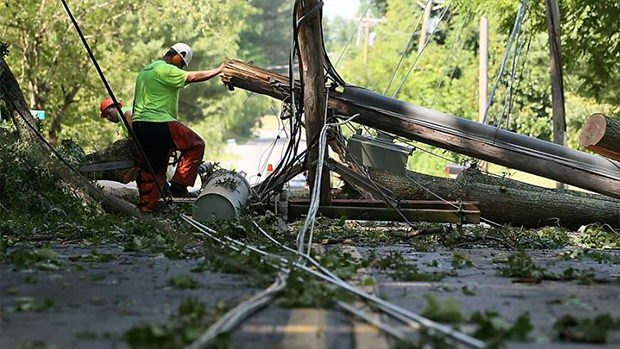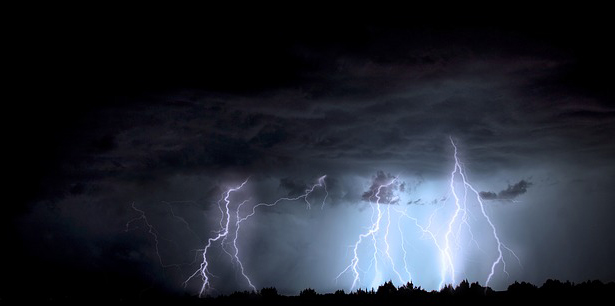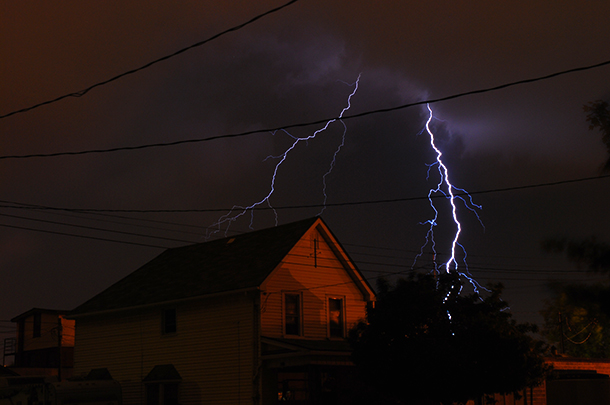With the New South Wales storm season approaching, now is a good time to remind those living in and/or working on Sydney’s North Shore and the Northern Beaches of the dangers that storms can cause to their home or workplace. In particular, a reminder about the dangers of fallen power lines is timely.
While bush fires during the summer season are front of mind, and are given priority by the media, storm damage has historically had a greater impact upon the state in sheer dollar terms than any other weather event (other than major flood events). Storms can cause widespread damage over vast areas in a short space of time.

Storm season on the calendar
Storm season in Sydney usually occurs in the summer months, however with recent climate changes, there really is no telling when a severe storm may come our way and wreak havoc on our homes and power lines. With rainfall spread evenly throughout the year there is actually the same amount of rain in summer as in winter. However there is one major difference, rain in summer tends to come in heavy downpours and storms over a short period of time.
On average Sydney receives around 20 thunderstorms each year. These storms are the main cause of property damage according to Insurance Business Australia, with “52% of all home claims lodged in the last financial year due to storm damage”. With figures like this, it’s imperative we take precautions around our home to prevent disasters especially in regards to power and power lines.
Why lightning is dangerous

From a young age we are taught about the dangers of lightning. We all know about the risks of being electrocuted if struck by lightning, but many people are unaware of just how much damage can be caused to a home if it, or surrounding power or telephone lines, are struck.
When lightning strikes a home or power line it can cause an electrical surge inside the home. An electrical surge is when a high voltage electrical current travels through electrical wires. This additional surge of power can be too much for appliances to handle, causing them to fail. Surges can also be dangerous for your family as they can cause fires or make appliances dangerous to touch.
Safety around fallen power lines
Whilst it’s no secret storm damage can be costly, one of the chief life-threatening hazards caused by storm damage is fallen power lines. Unfortunately, there is no way the average person can tell if fallen power lines are ‘live’. The best thing to do is to keep well away.
Contrary to popular opinion, you can actually receive an electric shock without physically touching a live line. Electricity can ‘jump’. This is known as ‘arcing’. If you do come across fallen power lines stay well clear of them and call emergency services or a power company immediately. A non negotiable rule in these circumstances is to treat all power lines as live and to keep at least eight metres away from them.
You can call the Ausgrid 24 hour emergency line on 13 13 88 to report dangerous poles and wires.
Preparations against falling power lines
Lightning and heavy rainfall have the potential to cause major damage to homes, as well as possibly being dangerous for residents. Because of this, it is vital you not only prepare your home for storm season to reduce the risk of damage to your home and injury to your family, but also have a emergency back up plan in place in case something does go wrong.
You can take precautions against falling power lines around your home before the storm season arrives. There are a few ways to do this.

- Lookout for branches that could fall
Make sure power lines are well clear of tree branches that could fall and bring them down in severe weather.
- Don’t plant trees near power lines
While planting trees and other large bushes close to or underneath power lines should always be discouraged, there are instances where trees have already been planted and their growth will impact upon power lines.
- Ensure trees are trimmed
It is imperative that all trees are trimmed to at least one metre from power lines with a buffer allowance for future growth. This buffer will vary depending upon the species of tree or plant that is trimmed.
You may need to hire the help of a licensed electrician who has the correct equipment such as an elevated work platform to trim your trees and remove any branches that could fall onto power lines.
Other checks you can make around your home
While it is impossible to prevent lightning and storms, there are a number of things you can do in and around your home to reduce the risk of an electrical surge as storm season approaches.
- Check wiring and power lines – faulty wiring around the home can increase the risk of damage and injuries if there is an electrical surge. Licensed electricians can check over wiring and your home’s connection to the power network to ensure that they are in correct and working order
- Install surge protection – surge protectors can help protect your home and family in case of an electrical surge by cutting power to the home. Surge protectors can be installed in your home by a licensed electrician, and while have a cost, this is far outweighed by the savings caused by damage to appliances if there is an electrical surge.
Power lines and your vehicle
In instances when you are travelling in a storm and your vehicle comes into contact with power lines, ensure you follow these steps.
- Sound your horn to alert people nearby that you are in difficulty.
- Alert potential helpers to the dangers of approaching the vehicle.
- Call 000 to seek emergency help. Emergency service workers will tell you when it is safe to exit the vehicle.
If there is a fire and you need to exit the vehicle in a hurry, be sure that you:
- Discard any loose clothing.
- Keep your feet together and your hands by your sides. Jump clear of the vehicle.
- When you are trying to get away from the vehicle, move away by shuffling your feet along the ground rather than raising them.
It’s also really important to never drive over a fallen power line. Driving over a fallen power line could result in pulling more poles or equipment down.
The inevitable
Unfortunately, storms will occur this summer and autumn. Sydney residents should be prepared to cope with all eventualities and understand the necessary action that should be taken in emergency situations.
If you live in Sydney’s North Shore or Northern Beaches suburbs and you need assistance in safeguarding your property against the dangers of power lines or need help with any other electrical matter, we invite you to call the friendly team at Everest Electrical today on 0410 229 139.


